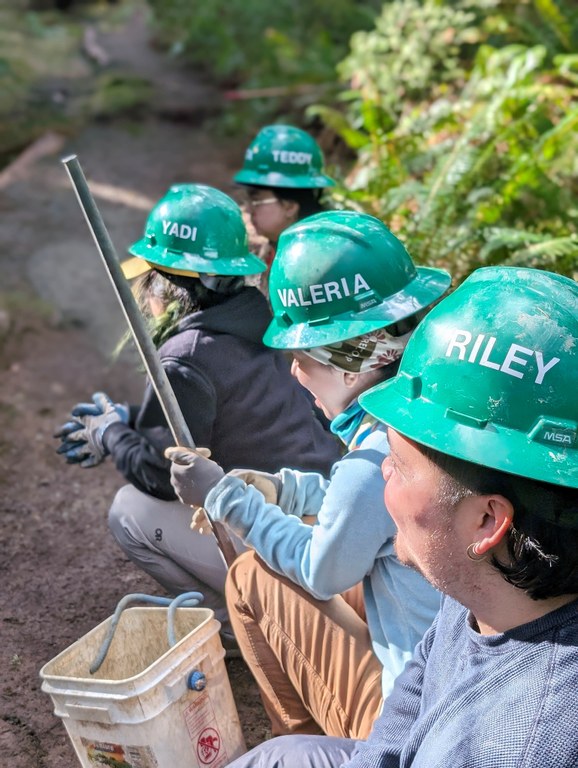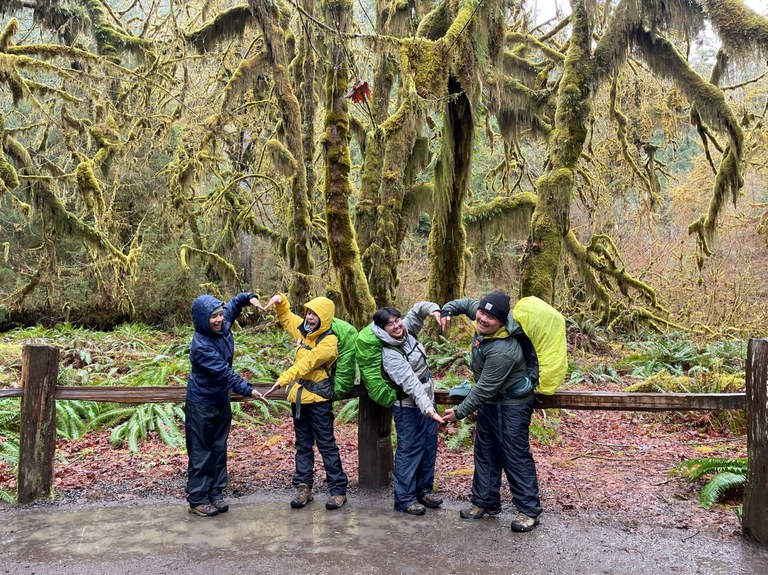WTA's Emerging Leaders Program ends on a high note
"It has been fulfilling to see where ELP alumni interests propel them on their endeavors after completing this program."
The fourth season of WTA’s Emerging Leaders Program (ELP), which helps young BIPOC professionals break into the outdoor industry, recently wrapped up. The 14-week program was packed with trail work, professional development and community building.
MJ Sampang, WTA’s Community Partnership and Leadership Development (CPLD) senior coordinator, says ELP provides pathways to folks — in particular, those from communities that have historically had inequitable access to the outdoors — into professional roles in the outdoor industry.
"Important programs like these give BIPOC early professionals an opportunity to learn more about the different types of careers in the outdoor industry and build upon tangible, applicable and leadership skills," MJ said.
And WTA's investment in future outdoor leaders through skill-training and professional development is one of the avenues by which we hope to encourage broader change and more diversity in the overall outdoor community.

The 2024 ELP team and cohort! From left to right: Yadi, Valeria, Angelic, Teddy, Riley, Michelle, MJ.
This year, the cohort included Riley, Teddy, Valeria and Yadi, who committed to developing their outdoor leadership skills and trail work abilities. The crew was led on trail by Michelle Mouw, a 2023 ELP cohort member who returned to take on this leadership role. In her second season, Angelic Friday, WTA’s ELP project coordinator, coordinated the trail work projects with land managers.
THE TRAIL WORK
There was no shortage of time on trail this season! During their many hours spent together in the field, the cohort members' shared experiences brought them closer, resulting in their crafting of a unique work culture and fostering of a safe, inclusive learning environment. Michelle, MJ and Angelic were impressed by how much the cohort learned and grew this season.
"The cohort did a fantastic job absorbing and learning all these trail skills that they were new to," Angelic said. "They honed their skills over these 14 weeks together and were never afraid of getting down and dirty on trail."

The cohort learned about building structures and trail maintenance during their 14 weeks. Photo by Tiffany Chou.
As in the previous year, ELP partnered with both Washington State Parks — at Wallace Falls, Dosewallips and Deception Pass state parks — and King County Parks — at Moss Lake and Glendale Forest. LeeAnne Jensen, King County Parks’ backcountry trail crew supervisor (and former WTA Puget Sound field manager and trail crew leader), has worked with ELP over the last couple of years. This year, she spoke to the crew about the history of Moss Lake.
"It is always inspiring to see a new cohort learn and grow together throughout their season. Being able to engage with the crew on meaningful trail projects is something we have looked forward to the past few years of the program," LeeAnne said.
The program has evolved over the last few years, and we work each year to make it a better learning experience for participants. One of the changes to this year’s ELP was in its scheduling — there was a cadence of two weeks on trail, followed by a week of professional development. This allowed the ELP team to find housing options near work sites, providing the cohort more time on trail, less time on the road and bonding with one another (featuring communal meals, dance parties, jam sessions and stretch parties). Some season highlights:
- The cohort broke ground on a brand-new trail in Dosewallips State Park. They also built new trail at Moss Lake. (For a total of over 170 feet of new trail!)
- They helped get WTA’s Central Puget Sound tool cache ready for our spring and summer trail work seasons and built box steps to aid a future project at Wallace Falls.
- They built a 20-foot rock retaining wall at Glendale Forest (a unique trail in that it is the only one that every ELP cohort over the years has worked on).
- Their final project — which took place over multiple days — involved decommissioning 14 box steps, and assembling and installing new ones at Solstice Park in West Seattle.
Each cohort member also completed 30 hours of saw skill training each to receive their sawyer A-level bucking certification from the Forest Service in WTA’s first all-BIPOC crosscut saw training. Patrick Wallum, WTA’s logistics coordinator, helped the crew learn the tools.

Every cohort member walked away from ELP with a sawyer certification. Photo by Michelle Mouw.
"Being able to guide such bright and eager members of the ELP cohort fuels my will to continue this work," he said. "I was pleasantly surprised by their ability to pick up such esoteric knowledge such as crosscutting. The depth of knowledge that’s required to fully wrap your head around the world of crosscuts and cutting trees took me years, it took the ELP cohort no more than 2 days."
Zachary Toliver, WTA’s South Puget Sound trails coordinator, spent a few days on trail with the cohort this year, too — notable, as he was a cohort member in ELP’s first iteration in 2021.
"Having a chance to help guide the latest cohort, to me, feels like a major success of this program," he said. "We're passing on skills, we're creating community and making genuine connections. For me, this is what ELP is about."
Justine Nishitani, WTA’s Northwest regional trails coordinator, also worked closely with the cohort over multiple days, on the Hoypus Point trail at Deception Pass State Park, building a 6-foot rock retaining wall and filling existing structures with gravel to level them out. Not only did they get plenty of work done together, they also cultivated a safe space for their small group.

As with all WTA work parties, the crew prioritized safety, fun and work — in that order. Photo by Michelle Mouw.
"It was a unique experience to be able to meet other BIPOC folks interested in the outdoors, talk freely about issues concerning us and have the space to exist together in community," Justine said.
THE PROFESSIONAL DEVELOPMENT
During the program, each cohort member dedicated time to an independent project to develop leadership skills and support WTA’s mission to improve trail accessibility for all. These projects are also a chance for members to gain skills or experience to apply to future career opportunities.
- Riley wrote an article for WTA’s Washington Trails magazine about using trail systems at Ebey State Park to harvest seaweed, speaking on their personal experiences with how the harvest brings communities closer.
- Teddy co-facilitated an ELP alumni trail work party, gaining knowledge of how to plan a trail work party, being a leader on trail and communication skills.
- Valeria helped organize a BIPOC community partner hike with WTA’s Outdoor Leadership Training (OLT) prorgam and ELP team, expressing her love for the Salish Sea through storytelling.
- Yadi wrote and shared with WTA staff a reflection piece on the importance of communities of color in Washington.
These independent projects were completed alongside other projects and activities the cohort took on together for their collective professional development. A snowshoeing workshop and backpacking trip with WTA’s OLT program were on the docket, but both were unfortunately canceled due to weather conditions. The cohort made the best of it — they took a trip to the Hoh Rainforest, and got the chance to work together to figure out contingency plans, and be adaptable.
ELP substituted the snowshoeing workshop with a hiking workshop at Point Defiance Park with WTA’s OLT program. Cohort members learned skills like trip planning, group management and assessing avalanche risk. WTA staff also presented about community outreach and partnership to the cohort, giving them an idea of the importance of that work and how it looks for the organization as a whole.
THE PEOPLE AND PARTNERS
When the cohort wasn’t on trail or working on their independent projects, they were meeting with community partners and other like-minded outdoor leaders. It’s an important part of the program — the cohort members can expand their outdoor industry networks and meet other professionals, many of whom are BIPOC themselves, who may share similar backgrounds or experiences.
"It is through connecting outside and learning from each other that the cohort can explore and understand what it means to be part of the professional outdoor community, and also how identities can be powerful to share and lean into," MJ said.
The cohort met with a variety of folks, including tribal members, cultural educators, non-profit organizers, board members, a DEI director, a state senator and an interpretive specialist — some who worked at grassroots organizations up to some who worked at the federal level.
THE COHORT
After 14 weeks together, the cohort members reflected on their time with ELP. The common themes in all of their reflections was how special the community they cultivated together was and how much they learned.

We're looking forward to seeing where these ELP alumni end up! Photo by Michelle Mouw.
"I was very excited for the fulfillment of being part of an all-BIPOC crew," Riley said. "And it happened! It went beyond expectations."
"I am proud of the bonds I’ve built with my cohort and the relationships I’ve gained with BIPOC community partners," Teddy said. "I challenged myself physically and professionally in this program and feel proud to have completed it."
"It was more than I anticipated. The community, support, experiences and everything in between. I learned so much from the programming, partners and the cohort," Valeria said.
"I felt successful as I learned more with each trail work project; more competent, capable and confident in my technical skills," Yadi said. "After this program, I can’t imagine going back to working in an office."
Moving ahead, Valeria and Yadi are joining WTA’s Lost Trails Found crew on a weeklong work party on the Emerald Lake trail. Riley is now working as a farm manager at Steel Wheel Farm in Fall City. And Teddy is exploring career opportunities in outdoor education and with BIPOC community organizations.
WTA looks forward to seeing where these alumni take their new skills and experiences. We hope to continue improving the program over its next iterations, working to find more partnerships and opportunities for cohort members and extending the length of the program.
"It has been fulfilling to see where ELP alumni interests propel them on their endeavors after completing this program," Angelic said. "We value this unique inclusive and supportive space that invests in BIPOC individuals to learn and grow."


Comments